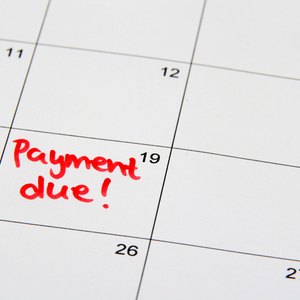
Every owner of a condominium unit becomes a member of the condo association, and members must pay dues or fees at regular intervals, usually monthly. Condo associations use the funds collected from dues to pay for general maintenance, major renovations and repairs to common areas. The dues may also cover some of the condo owner’s utilities or other services. As each condo owner depends on the other owners to pay the dues to maintain the property, condo associations will use a variety of measures to collect money owed. Failing to pay condo dues can have serious consequences for a condo owner.
Fines and Penalties
Fines are the most common penalty for failure to pay dues or for paying them late. The condo association’s rules will stipulate how much the association can charge for fines and late fees, and states may also have laws regarding the amount of the penalties. The amount is generally a set percentage and will continue to accrue until the condo owner gets current. State laws usually allow condo associations to enforce payment of both the late dues as well as any associated fees and penalties.
Associations Can Sue
Condo associations may file suit against condo owners who are not making payments. Condo associations will generally avoid this tactic; however, condo owners should arrange a payment plan and keep up-to-date on payments. Condo owners who are not making dues payment are unlikely to win in court, since these dues are part of homeowner's associations contracts, in most cases. Should the dispute go to court, the condo owner may be ordered to pay the condo association’s legal expenses as well
Liens on the Property
After the condo association wins a judgment in court against an owner for not paying dues, the most common enforcement action allows the association to place a lien against the condo. In some states, a condo association may place a lien for unpaid dues without suing the owner. A lien represents a claim against the property, forbidding the owner from selling or refinancing the property without satisfying the lien. In order to satisfy the lien, the owner must pay both the late dues and related fees.
Other Enforcement
Once a condo association has a judgment from court, the association may also take other enforcement actions beyond placing a lien against a property. The association can levy a wage withholding against the condo owner, forcing the owner’s employer to send a portion of the owner’s wages to the condo association to pay the dues. Condo associations can also foreclose on a condo if an owner is not paying dues. Though foreclosing on a condo for failure to pay dues is not common, a condo association can do so when an owner fails to pay dues for an extended period of time.
References
- "Kitsap Sun"; Foreclosures for Failure to Pay Condo Dues on Rise, Experts Say; Derek Sheppard; May 2009
- "New England Condominium"; Q&A: Can't the Board Ease Up on Late Fees?; Joseph Saurino, Esq.
- "Sun Sentinel"; More Owners Failing to Pay Share of Fees, Assessments; Joe Kollin; November 2007
- MSN Real Estate; Condo owners: 7 Tips for Getting Your Neighbors to Pay Up; Marilyn Lewis
- National Council of State Housing Authorities. "FHA Issues New Review Requirements for Condominium Loans." Accessed May 11, 2020.
- First Heritage Mortgage. "What Is a Non-Warrantable Condo?" Accessed May 11, 2020.
- United States Government. "Code of Federal Regulations: Title 24, Housing and Urban Development. Part 234, Condominium Ownership Mortgage Insurance." Accessed May 11, 2020.
Writer Bio
Jay Motes is a writer who sold his first article in 1998. Motes has written for numerous print and online publications including "The Dollar Stretcher" and "WV Sportsman." He holds a Bachelor of Arts with a double major in history and political science form Fairmont State College in Fairmont, W.V.

